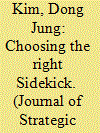| Srl | Item |
| 1 |
ID:
148224


|
|
|
|
|
| Summary/Abstract |
Scholars and practitioners of grand strategy agree that the use of military force should be supplemented by appropriate economic policies. However, strangely few accounts of economic complements to military grand strategies have been presented in recent discourse on US grand strategy. This paper takes a first step to fill this information gap. I first assess the role that could be played by economic measures under two types of grand strategies – one focusing on the balance of power and the other emphasising influence and order. Second, I introduce what I call ‘the influence-capability dilemma’ and discuss tradeoffs in adopting certain economic policies in order to help the US sustain pre-eminence in the international system. Third, I discuss how the US should address this dilemma of economic means in dealing with the rising China.
|
|
|
|
|
|
|
|
|
|
|
|
|
|
|
|
| 2 |
ID:
151320


|
|
|
|
|
| Summary/Abstract |
China has witnessed a continual drop in the labour income share of its gross domestic product (GDP) and a steep rise in income that has caused a savings glut and high investments. China’s shrinking domestic demand indicates that its output growth must increasingly rely on expanded manufacturing exports to the US. China’s state accommodation for US offshoring further aggravates trade imbalances between the two countries. The United States is also experiencing a rise in social inequality associated with a decline in savings that is a fundamental cause of its current-account deficit with China. The swelling US service sector interacts with a high ratio of consumption to income, and the liberal US policy for cost outsourcing to China has a complicated impact on employment and an adverse effect on inequality.
|
|
|
|
|
|
|
|
|
|
|
|
|
|
|
|
| 3 |
ID:
167606


|
|
|
|
|
| Summary/Abstract |
All major theoretical approaches that explain the growing rivalry between the United States (US) and China share a common prediction: as tensions develop, the US and China will each construct a master narrative emphasizing zero-sum interests, the efficacy of coercion, and the perceived blamelessness of the Self for the Other’s aggressions. However, the concrete process by which these narratives emerge has been neither explicitly theorized nor measured in practice. We theorize that in the digital media age, narratives emerge when ‘memes’—discrete, widely circulated images/descriptions of the Self or Other—are connected into coherent stories that eventually coalesce into a master narrative of rivalry. We therefore argue that tracking the speed and spread of memes provides a useful indicator of security dilemma dynamics. To this end, we note that in the United States the US–China rivalry is associated with a prominent meme that describes China as ‘challenging the international rules-based order’ (RBO). We use qualitative and quantitative text analysis, including network and plagiarism analysis, to track the spread of this meme. We provide preliminary evidence that the RBO meme and the ‘revisionist China’ narrative may be crowding out other, less malign narratives about China’s rise.
|
|
|
|
|
|
|
|
|
|
|
|
|
|
|
|